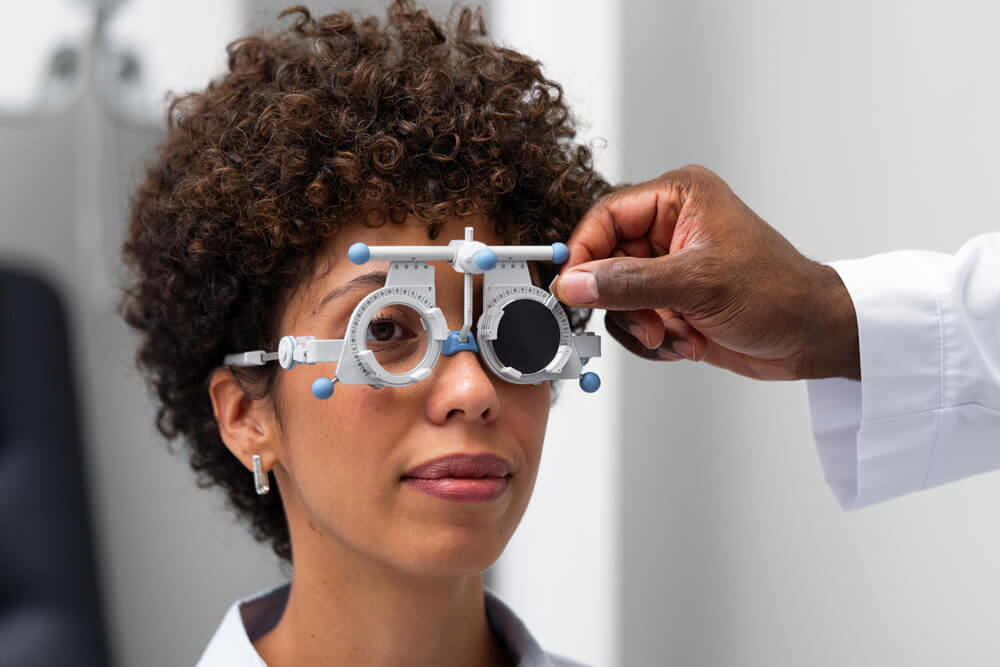The Price of Clarity: Exploring the Cost of LASIK Surgery
Posted by: Ophthalmology Associates of Fort Worth in Uncategorized

Laser-assisted in situ keratomileusis (LASIK) surgery is a type of eye surgery where a laser is used to reshape the cornea, correcting a refractive error such as nearsightedness, farsightedness, and astigmatism.
LASIK eye surgery has become an increasingly popular vision correction option for individuals who want to improve their eyesight without relying on glasses or contact lenses.
However, before deciding to undergo LASIK eye surgery, it’s important to understand the factors influencing its cost. This article will explore the cost of LASIK, its contributing factors, and budgeting tips for those considering the procedure.

Understanding the Financial Investment: LASIK Eye Surgery Cost
LASIK eye surgery costs depend on several factors, including the following:
- Technology: The type of technology used during the procedure can greatly impact the cost. For example, bladeless LASIK, which uses a femtosecond laser instead of a traditional surgical tool called a microkeratome, may cost more due to its advanced technology.
- Surgeon’s Expertise: The surgical experience and expertise of the eye doctor performing the procedure also play a role in the cost of LASIK. Highly trained and experienced surgeons may charge more for their services.
- Geographical Location: The location of the LASIK clinic can also affect the cost, as prices may vary by state or city due to different healthcare systems and overhead expenses.
During an initial LASIK consultation, the eye surgeon will assess the patient’s eyes and determine which technology and surgical approach will be most effective for their individual needs.
The cost of the procedure may also vary based on these factors and the severity of the patient’s vision impairment.
So if you’re wondering, “How much does LASIK cost?” it’s best to schedule a consultation with an experienced surgeon for an accurate estimate tailored to your specific needs.
Despite the costs, however, LASIK eye surgery offers more long-term financial benefits compared to ongoing expenses associated with prescription glasses or contact lenses.
With LASIK, there are no more annual optical exams and eye prescription updates, contact lens solutions, or the need for backup glasses.
Exploring Average Costs Without the Fine Print
Average Cost (LASIK)
The cost of LASIK procedure varies depending on the factors mentioned above, but the average price ranges from moderate to high.
There are also other medical expenses involved, such as pre- and post-operative care, which may not be included in the initial cost estimate.
In some cases, a second procedure may be required for enhancement and fine-tuning, which may add up to the overall cost.
However, it must be noted that the real cost of LASIK eye surgery is just as unique as the individual case of each patient. It is best to discuss cost specifics with the eye surgeon during the initial consultation.
Geographical Considerations
In some regions, LASIK cost may be lower due to competition among clinics, while in others, it may be higher due to a higher demand for LASIK surgery.
For example, the average cost of LASIK surgery in a major metropolitan area such as New York City or Los Angeles may be higher compared to a smaller city or town.
It’s important to research and compare prices from different clinics and LASIK centers before making a decision.
Many individuals assume that LASIK eye surgery is too expensive and a financial burden. However, with the availability of financing options and the long-term cost savings associated with LASIK surgery, it may be more affordable than they realize.
At Ophthalmology Associates, we offer flexible payment plans and accept various forms of insurance to help make LASIK eye surgery accessible for our patients.
Preparing Your Wallet: Budgeting for LASIK
How to Prepare for LASIK (Financial Aspect)
An important aspect of preparing for LASIK procedures is budgeting for the cost of surgery. Here are some tips to help you prepare financially:
- Start saving early: It’s never too early to start setting aside money for your LASIK procedure. Even small, consistent contributions can add up over time.
- Research on “hidden” fees: Make sure to inquire about any additional costs that may not be included in the initial estimate, such as facility fees, medication, and post-operative exams.
- Consider financing options: Many clinics offer financing plans or work with third-party lenders to provide patients with manageable payment plans (e.g., monthly payments). Look into these options and see if they may be a good fit for your budget.
- Use pre-tax dollars: Some employers offer Flexible Spending Account (FSA) or Health Savings Account (HSA), which allow employees to set aside pre-tax dollars for medical expenses such as LASIK eye surgery. Check with your employer to see if this is an option for you.

Is LASIK covered by insurance in the USA?
As LASIK and other laser eye surgery are considered an elective procedure, most insurance plans do not cover LASIK. However, there are some exceptions to this rule:
- Flexible Spending Account (FSA): As mentioned earlier, an FSA can be used to pay for LASIK surgery with pre-tax dollars.
- Health Savings Account (HSA): If you have an HSA and have reached your deductible, you may be able to use these funds for LASIK surgery.
- LASIK as a deductible expense: In some cases, LASIK may be considered a deductible medical expense on your tax return if it is deemed necessary for the treatment of a specific medical condition or impairment. This determination would need to be made by a qualified healthcare professional and documented with an official diagnosis.
It’s important to check with your insurance provider and healthcare professional to determine if any of these options apply to you.
Beyond the Price Tag: Factors to Consider
While it may be tempting to opt for low-cost LASIK procedures, there’s value in considering the quality and safety of the provider as well.
It is prudent to research the following factors to ensure you’re receiving care from a qualified and reputable professional:
- Experience and certifications: Specialized vision correction surgeries require a board-certified ophthalmologist. The most experienced surgeons may usually require higher surgeon fees.
- Technology and equipment: A reputable provider will use state-of-the-art technology and equipment for LASIK procedures. Be sure to research the technology used by your potential provider and compare it to other options.
- LASIK success rates: Ask your provider about their success rates for LASIK procedures. This will say a lot about their skills and experience as a surgeon.
- Patient reviews and testimonials: Research patient reviews and testimonials from previous patients to get an idea of their experience with a particular provider.
In addition, comprehensive pre-operative evaluations and post-operative care are crucial in ensuring successful outcomes. This may include follow-up appointments, medication, and any necessary enhancement procedures.
While these additional services may come at an extra cost, they are essential in achieving the best results and avoiding complications. Therefore, it’s important to factor these potential costs into your budget when considering LASIK surgery.
Remember, your eyesight is a precious asset and it’s worth investing in quality care for the best possible outcomes.
Maximizing Value: Preparing for LASIK Surgery
How to Prepare for LASIK (Other Factors)
Preparing for LASIK eye surgery not only involves budgeting for the procedure, but also preparing yourself mentally and physically. Here are some tips to help you get ready for your LASIK surgery:
- Discuss any concerns or hesitations with your LASIK surgeon: It’s normal to feel anxious before undergoing a surgical procedure. Make sure to address any concerns with your doctor beforehand so that they can provide reassurance and address any misconceptions.
- Follow all pre-operative instructions: Your LASIK surgeon will provide you with specific instructions to prepare for your surgery, such as avoiding certain medications or contact lenses before the procedure. It’s important to follow these instructions closely to ensure the best possible outcome.
- Make any necessary lifestyle adjustments: Depending on your current habits, your doctor may advise you to make some lifestyle changes before and after your surgery. This may include avoiding alcohol or smoking, getting adequate rest, and staying hydrated.
- Attend follow-up appointments: Your LASIK procedure is not a one-time event; it requires ongoing monitoring and care. Attend all scheduled follow-up appointments to ensure that your eyes are healing properly.
As you weigh your options, consider reaching out to local eye care professional organizations or checking the American Board of Ophthalmology (ABO) for board-certified ophthalmologists with special expertise in LASIK surgeries.
Further, resources like the American Refractive Surgery Council offer a wealth of information on LASIK, including questions to ask your surgeon and details on the latest advances in LASIK technology.

A Clear Vision for the Future: LASIK Surgery Cost
Investing in LASIK surgery offers lifetime value and freedom from corrective eyewear. While the procedure may involve a high cost upfront, its potential long-term benefits surely outweigh the immediate expense.
With advancements in technology and increasing competition, LASIK surgery is becoming more affordable and accessible for patients of all income levels. And at Ophthalmology Associates, we ensure that our patients receive the highest standard of care at competitive prices.
To make LASIK surgery even more accessible to everyone, we have several locations all around Texas and offer financing options for qualified patients.
Don’t let cost be a barrier to achieving clearer vision. Explore LASIK surgery today and invest in a brighter future for your eyesight.
Book your appointment today at Ophthalmology Associates!
